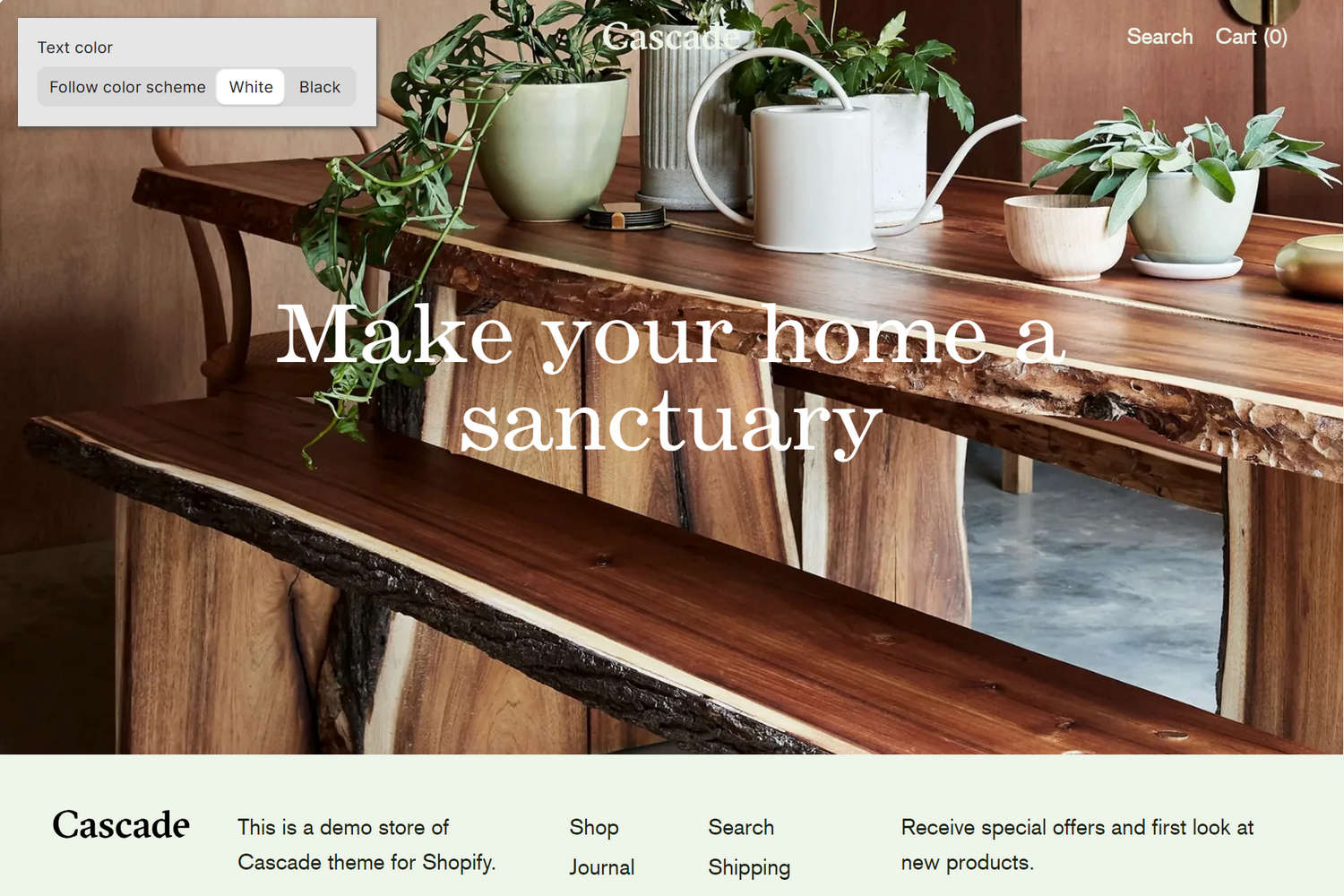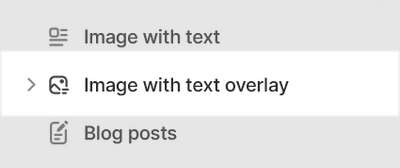Appearance
Image with text overlay
This guide describes setting up an Image with text overlay section.
Use the section to display an image, overlaid with text, on a store page.

The previous image shows an Image with text overlay section on a store's home page. In the upper left, part of Theme editor's section settings are displayed. The menu's Text alignment option is set to Center. This option aligns the text Make your home a sanctuary to the center, inside the section.
For general guidance with modifying sections, refer to Sections overview and Shopify help: Sections and blocks.
Set up an image with text overlay section
To set up an Image with text overlay section:
Go to Customize theme.
In Theme editor, at the top of the page, use the dropdown to select a page that contains an Image with text overlay section.
Note
The section can be added into any page, except Checkout and Giftcard pages. To add the section into the current page, select Add section > Image with text overlay. Refer to Shopify help: Add a section.
From the side menu, select Image with text overlay.

Select a setting described in the following table.
| Setting name | Description |
|---|---|
| Image | Use the Image selector options to setup an image to display inside the section. Refer to Edit an image inside a section or block. |
| Image > Connect dynamic source | To display an image from a dynamic source, if available, select the Connect dynamic source icon beside the Image selector, and then choose a metafield to add. Refer to Shopify help: Metafields. |
| Heading | In the Heading box, enter text to display as a heading (title) inside the section. |
| Heading > Connect dynamic source | To display heading text from a dynamic source, if available, select the Connect dynamic source icon beside the Heading box, and then choose a metafield to add. Refer to Shopify help: Metafields. |
| Content > Mobile font size scale | Use the Mobile font size scale slider to specify a size for (content) text inside the section. This setting applies to mobile display devices. The slider ranges from -2 to 7. |
| Content > Desktop font size scale | Use the Desktop font size scale slider to specify a size for (content) text inside the section. This setting applies to desktop display devices. The slider ranges from -2 to 10. |
| Text | In the Text box, enter (body) text to display inside the section's text area. Format the text and add links by using the Text editor pane. |
| Text > Insert dynamic source | To display (body) text from a dynamic source, if available, select the icon Insert dynamic source beside the Text box, and then choose a metafield to add. Refer to Shopify help: Metafields. |
| Show scroll down arrow | Select the checkbox Show scroll down arrow to show/hide an arrow (down) icon inside the section. |
| Layout > Aspect ratio – mobile | Use the dropdown Image aspect ratio - mobile to set the width-to-height ratio for images inside the section. The options are Portrait (4:3), Square (1:1), Classic (4:3), Widescreen (16:9), Extra wide (2.35:1), and Full screen. This setting applies to mobile display devices. |
| Layout > Aspect ratio – desktop | Use the dropdown Image aspect ratio – desktop to set the width-to-height ratio for images inside the section. The options are: Same as mobile, Classic (4:3), Widescreen (16:9), Cinematic (2.35:1), and Full screen. This setting applies to desktop display devices. |
| Layout > Content position | Use the Content position dropdown to set a position for the section's content area. The options are Middle left, Middle center, Middle right, Bottom left, Bottom center, and Bottom right. |
| Layout > Text alignment | Use the Text alignment options to align text inside the section to the Left, Center, or Right. |
| Layout > Display content below image on mobile | Select the checkbox Display content below image on mobile turn on/off displaying the section's content area below the image. The setting applies to mobile display devices. With this setting off, the content area overlays the image. |
| Color > Color scheme | Use the Color scheme options to select a color scheme for the section. Refer to Colors. |
| Color > Disable transition | Select the checkbox Disable transition to turn on/off overriding the color transitions set in the section's theme settings. |
| Theme settings | If available, select Theme settings to access additional settings for the section. Refer to Section theme settings menu. |
| Custom CSS | Select Custom CSS. In the box, enter custom CSS styles to apply only to the current section. Refer to Shopify help: Add custom CSS. To apply custom styles to your entire online store, refer to Theme settings > Custom CSS. |
| Remove section | Select Remove section to delete the section from the current page. |
Configure a block within an image with text overlay section
A default Image with text overlay section contains no blocks. To configure a block inside the section:
Go to Customize theme.
In Theme editor, at the top of the page, use the dropdown to select a page that contains an Image with text overlay section.
From the side menu, expand the Image with text overlay section menu.
To configure an existing block, select the block from the side menu.
To add a new block, select Add block, choose a block to add, and then select the block you added.

Note
Inside the section, you can add, remove, show, hide, or move blocks. Refer to Configure blocks inside a section, and Shopify help: Sections and blocks.
Apply a block setting described in the Table: Image with text overlay blocks.
Table: Image with text overlay blocks
The following table describes the blocks inside the Image with text overlay section, and their corresponding settings.
To configure a block, refer to Configure a block within an image with text overlay section.
| Block name | Block description | Block setting(s) |
|---|---|---|
| Button | Displays a button inside the section. |
|
| Color | Adds an overlay, with a specified color, to the section. |
|
| CSS background | Adds an overlay, with a specified (CSS) color gradient, to the section. |
|